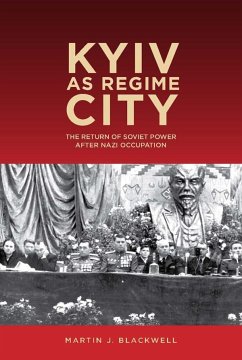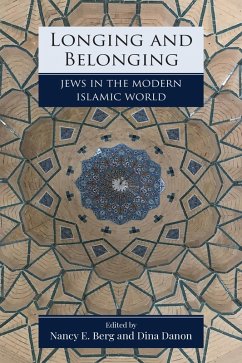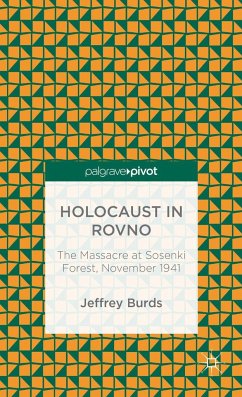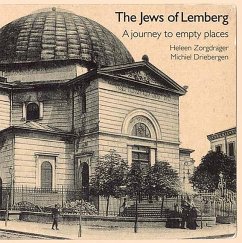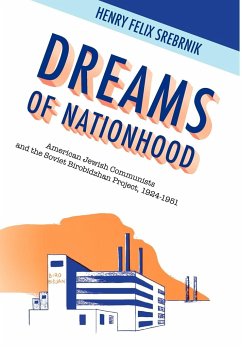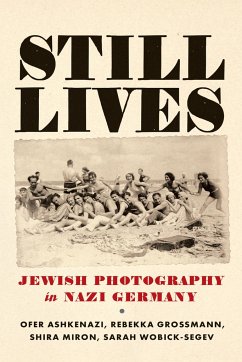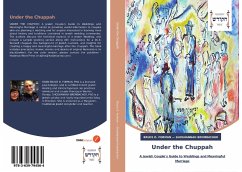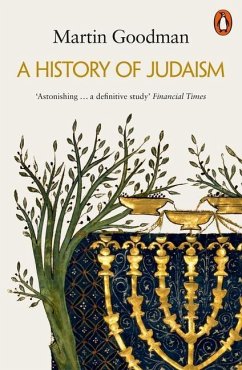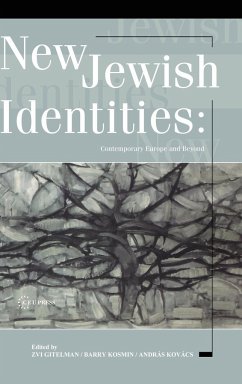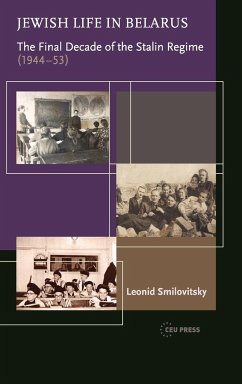Nicht lieferbar
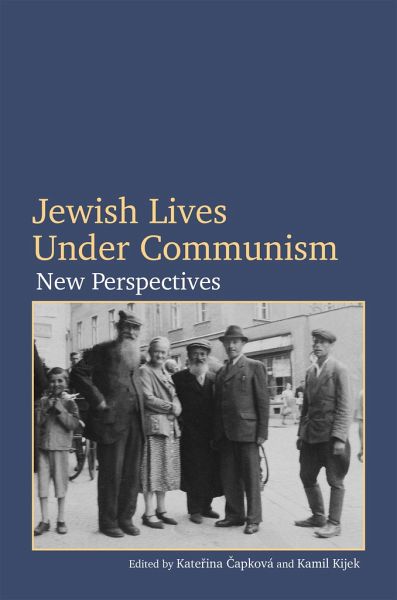
Jewish Lives Under Communism
New Perspectives
Herausgeber: Capková, Katerina; Kijek, Kamil
Versandkostenfrei!
Nicht lieferbar




This volume provides new, groundbreaking views of Jewish life in the pro-Soviet bloc from the end of the Second World War until the collapse of Communism in late 1989 by recovering and analyzing the agency of Jews and their creativity in Communist Europe after the Holocaust.
Notes on Contributors Kata Bohus is a senior research advisor at UiT - the Arctic University of Norway. Previously, she worked as an international fellow at the Jewish Museum Frankfurt/Simon Dubnow Institute Leipzig, where she curated a temporary exhibition on the history of Jews in Europe after WWII. She co-edited the volume "Our Courage. Jews in Postwar Europe 1945-48" (with Atina Grossmann, Werner Hanak, and Mirjam Wenzel), Berlin, 2020. She has published several articles on Holocaust memory and memorialization in communist Hungary, on the reception history of Anne Frank's diary, and communist interpretations of the Eichmann trial in Eastern Europe. Kate¿ina ¿apková is a senior researcher at the Institute of Contemporary History, Prague, and a teacher at Charles University and NYU in Prague. Her Czechs, Germans, Jews? National Identity and the Jews of Bohemia (Berghahn, 2012; in Czech 2005 and 2014) was called the Outstanding Academic Title of 2012 by Choice magazine. With Michal Frankl, she co-authored Unsichere Zuflucht (Böhlau, 2012), which is about people fleeing to Czechoslovakia from Nazi Germany and Austria. With Hillel Kieval she is co-editor of the volume Prague and Beyond: Jews in the Bohemian Lands (Penn Press, 2021). Thanks to the ACLS Collaborative Research Fellowship, she is currently working (with Diana Dumitru and Chad Bryant) on a book about the Rudolf Slánský Trial (to be published by OUP). Diana Dumitru is an Associate Professor of History at Ion Creang¿ State University of Moldova. She has authored two books and more than forty academic articles. Her second book, The State, Antisemitism, and Collaboration in the Holocaust: The Borderlands of Romania and the Soviet Union, was published by Cambridge University Press in 2016 (in Romanian, in 2019). Her article ‘Constructing Interethnic Conflict and Cooperation: Why Some People Harmed Jews and Others Helped Them during the Holocaust in Romania’ (co-authored with Carter Johnson, and published in World Politics) received the 2012 Mary Parker Follett Award for the best article or chapter published in the field of politics and history. Valery Dymshits is a research fellow at the Petersburg Judaica Centre, European University, Saint Petersburg, and a professor at the Liberal Arts Department of Saint Petersburg State University. His chief area of research is the cultural anthropology and folklore of East European Jewry, folk and academic Jewish art, Yiddish literature, Russian-Jewish literature. In his translations or under his editing were published about 25 books and collection of articles, including ¿¿¿¿¿¿¿¿¿ ¿¿¿¿¿¿¿¿ ¿¿¿¿¿¿ (Jewish folk tales, St Petersburg, 1999), ¿¿¿¿¿, XXI ¿¿¿ (The shtetl, the 21st century, St Petersburg, 2008). He is member of editorial board of the journals ¿¿¿¿¿ ¿¿¿¿¿ ¿ ¿¿¿¿ ¿¿¿¿ (The nation of the book in a world of books, St. Petersburg), Judaic-Slavic Journal (Moskow), Yiddishland (Jerusalem). Gennady Estraikh is a professor at the Skirball Department of Hebrew and Judaic Studies, New York University, where he also directs the Shvidler Project for the History of the Jews of the Soviet Union. His fields of expertise are Jewish intellectual history, Yiddish language and literature, and Soviet Jewish history. His publications include Soviet Yiddish (OUP, 1999), In Harness: Yiddish Writers’ Romance with Communism (Syracuse University Press, 2005), Yiddish in the Cold War (Legenda, 2008), ¿¿¿¿¿¿¿¿¿ ¿¿¿¿¿¿¿¿¿¿¿¿ ¿¿¿¿¿ ¿¿¿¿¿¿ (¿¿¿¿¿¿¿¿¿¿¿ ¿¿¿¿¿¿¿¿¿¿¿ ¿ ¿¿¿¿¿ ¿¿¿¿¿¿¿¿¿¿, 2015), Transatlantic Russian Jewishness (Academic Studies Press, 2020), and over a dozen co-edited volumes. Kamil Kijek is an Assistant Professor at the Jewish Studies Department, University of Wroc¿aw, Poland. His publications include 'Dzieci modernizmu: ¿wiadomö¿, kultura i socjalizacja polityczna m¿odzie¿y ¿ydowskiej w Polsce mi¿dzywojennej' (Children of modernism: The socialization, culture and political consciousness of the Jewish youth in Interwar Poland), Wroc¿aw 2017, for which he had received international prize from The Leonid Nevzlin Research Center for Russian and East-European Jewry at the Hebrew University of Jerusalem, as well as various articles in journals such as Jewish Social Studies, Polin, Gal-Ed, Journal of the Genocide Research. Anna Koch is the Francis L. Carsten DAAD lecturer at University College London, School of Slavonic and East European History. She received her PhD from New York University in 2015. Her book manuscript ‘Home after Fascism: Italian and German Jews after the Holocaust’ is forthcoming with Indiana University Press in 2022. She has published several articles on Italian and German Jewish history, and currently co-edits a volume on Holocaust Memory in Eastern and Western Europe. Her current research examines the lives of German Communists of Jewish origin between 1918 and 1952. David Shneer ¿¿¿ (1972-2020) was a Louis P. Singer Endowed Chair in Jewish History, Professor of History and Jewish Studies, and Chair of the Department of Religious Studies at the University of Colorado, Boulder. He was a Distinguished Lecturer for the Association for Jewish Studies and co-editor in chief of East European Jewish Affairs. He was the author or editor of several prize winning books including Yiddish and the Creation of Soviet Jewish Culture (Cambridge, 2005), Through Soviet Jewish Eyes: Photography, War, and the Holocaust (Rutgers, 2011) and Grief: The Biography of a Holocaust Photograph (Oxford, 2020). Anna Shternshis is the Al and Malka Green Professor of Yiddish studies and director of the Anne Tanenbaum Centre for Jewish Studies at the University of Toronto. She received her doctoral degree (DPhil) from Oxford University in 2001. Shternshis is the author of Soviet and Kosher: Jewish Popular Culture in the Soviet Union, 1923 - 1939 (Indiana UP, 2006) and When Sonia Met Boris: An Oral History of Jewish Life under Stalin (Oxford UP, 2017). Together with artist Psoy Korolenko, Shternshis created and directed the Grammy-nominated Yiddish Glory project, an initiative that brought back to life forgotten Yiddish music written during the Holocaust in the Soviet Union. A recipient of 2020 Guggenheim Fellowship, she is currently working on a book tentatively entitled Last Yiddish Heroes: A Lost and Found Archive of the Holocaust in the Soviet Union about Yiddish music created in Nazi-occupied Ukraine. Marcos Silber is Associate Professor and former Chair of the Department of Jewish History, the University of Haifa. He has written on Polish-Israeli relations, migrations between the two countries, Jewish Diaspora Nationalism in Poland, Lithuania, and Russia in the early twentieth century as well as on Yiddish and Polish cinema and popular culture in inter-war Poland. With Szymon Rudnicki he has published a selection of documents on Polish-Israeli diplomatic relations, 1945–67 (2009, in Polish and Hebrew editions) and, in Hebrew, a book whose title translates as ‘Different Nationality, Equal Citizenship! The Efforts to Achieve Autonomy for Polish Jewry during the First World War’ (2014). Stephan Stach has been researcher of East Central European History of the 20th century with a focus on Poland, Polish-Jewish relations, and Holocaust Memory in the Cold War era. He held positions at academic institutions in Germany, the Czech Republic and Poland. Since June 2020 works as Executive Director of the party Bündnis 90 / Die Grünen in Saxony. He co-edited volumes on inter-war Polish nationalities policy (with Chrishardt Henschel, Zeitschrift für Ostmitteleuropaforschung, 62/2, 2013), dissidents’ memories of the Second World War and the Holocaust (with Peter Hallama, Gegengeschichte: Zweiter Weltkrieg und Holocaust im ostmitteleuropäischen Dissens, Leipzig, 2015), and on the relation between antifascism and Holocaust Memory in Eastern Europe (with Kata Bohus and Peter Hallama, Growing in the Shadow of Antifascism, Budapest 2021). Galina Zelenina is an associate professor at the Department for Jewish Theology, Biblical and Jewish Studies, Russian State University of the Humanities, and a senior research fellow at the School for Advanced Studies in the Humanities, The Russian Presidential Academy of National Economy and Public Administration, Moscow. She is the author of ¿¿ ¿¿¿¿¿¿¿¿ ¿¿¿¿ ¿ ¿¿¿¿¿ ¿¿¿¿: ¿¿¿¿¿¿¿¿¿¿ ¿¿¿¿¿ ¿ ¿¿¿¿¿¿¿¿¿¿¿¿¿ ¿¿¿¿¿¿¿ (2007) on court Jews in medieval and early modern Spain, ¿¿¿¿¿¿¿ ¿¿¿: ¿¿¿¿¿¿¿¿¿ ¿ ¿¿¿¿¿ (2015) on the revival of Jewish studies in late Soviet and post-Soviet Russia, and ¿¿¿¿¿¿¿¿ ¿¿¿¿ ¿¿¿¿¿¿¿¿: ¿¿¿¿¿ ¿ ¿¿¿¿¿¿ ¿¿¿ ¿¿¿¿¿¿¿¿ ¿¿¿¿¿¿¿¿¿¿ (2018) on Conversos and the Spanish inquisition as well as a number of articles on Soviet and post-Soviet Jewish history.
Produktdetails
- Verlag: Rutgers University Press
- Seitenzahl: 280
- Erscheinungstermin: 15. Juli 2022
- Englisch
- Abmessung: 235mm x 156mm x 20mm
- Gewicht: 467g
- ISBN-13: 9781978830806
- ISBN-10: 1978830807
- Artikelnr.: 68487242
Herstellerkennzeichnung
Libri GmbH
Europaallee 1
36244 Bad Hersfeld
gpsr@libri.de
Für dieses Produkt wurde noch keine Bewertung abgegeben. Wir würden uns sehr freuen, wenn du die erste Bewertung schreibst!
Eine Bewertung schreiben
Eine Bewertung schreiben
Andere Kunden interessierten sich für



